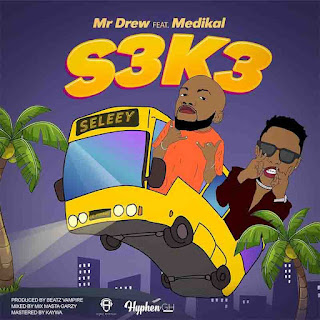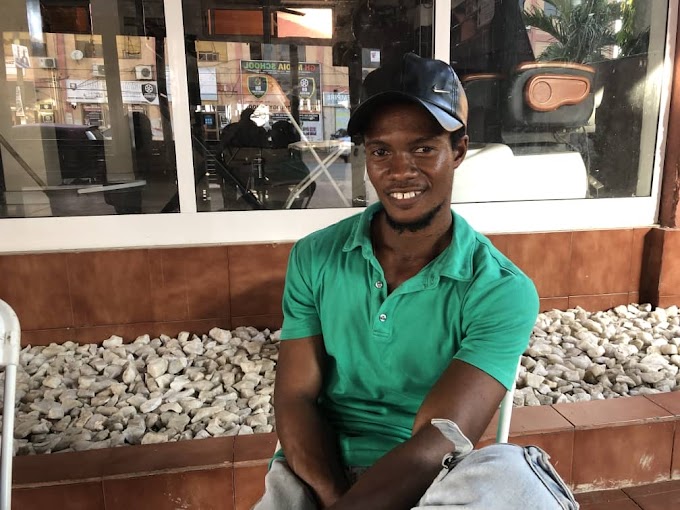 |
| Ghana Mourns a Legend: Highlife Icon Daddy Lumba Dies at 60 |
Ghana is draped in sorrow following the passing of one of its most celebrated musical icons, Charles Kwadwo Fosu, affectionately known across generations as Daddy Lumba.
The 60-year-old maestro, whose music has been the heartbeat of many Ghanaian homes, passed away in the early hours of Saturday, July 26, 2025, at the Bank Hospital in Accra, where he was receiving medical care for an undisclosed illness.
The news of his demise was met with profound shock and grief as fans, friends, and fellow musicians struggled to come to terms with the loss of a man whose voice became the soulful soundtrack of love, struggle, and celebration for over four decades.
According to sources close to the family, Daddy Lumba had been battling a medical condition in silence. He was admitted to the hospital several days before his passing and succumbed to the illness just before dawn. By midday, throngs of mourners had gathered at his East Legon residence, their faces etched with disbelief and heartbreak, proving yet again how deeply entrenched Daddy Lumba was in the lives of everyday Ghanaians.
In a statement issued through their legal counsel, Baba Jamal & Associates, the family mourned not just the death of a musician, but the departure of a national treasure.
“Daddy Lumba was more than a musician; he was a cultural icon whose music touched countless lives,” the statement read.
“His soulful voice provided the soundtrack to our love stories, and his poignant lyrics captured the poetry of our struggles, dreams, and resilience.”
The family has asked for privacy during this difficult time, assuring the public that funeral arrangements will be communicated in due course. The announcement was signed by Fati Ali Yallah, Esq., representing the Fosu family.
Born on September 29, 1964, in Ghana, Daddy Lumba started his music journey early. At just 16, he was already forming musical groups, including the original Lumba Brothers at Juaben Senior High School, with schoolmates Yaw, Kwabena, and his then-girlfriend Theresa Abebrese. His passion and talent were evident even at that tender age.
After completing school, Lumba’s life took a transformative turn when he moved to Germany, thanks to support from Theresa. It was in Germany that he crossed paths with Ernest Nana Acheampong, another Ghanaian musician living abroad. Nana had already founded a group called Talking Dreams, but it was his collaboration with Lumba that birthed a new era in Ghanaian music.
Although Lumba was originally inclined toward gospel music, Nana Acheampong introduced him to highlife, a genre that would become his signature sound. Together, they revived the name Lumba Brothers and set out to produce music. Despite financial difficulties, they successfully released their debut album in 1989, titled Yɛɛyɛ Aka Akwantuo Mu, thanks to funding from Lumba’s wife, Akosua Serwaa.
Over the course of his stellar career, Daddy Lumba released 33 albums, with the 34th reportedly in the works before his untimely passing. His discography is a kaleidoscope of themes—ranging from deep spirituality to controversial romantic ballads. Albums like Aben Wɔha, Awosuɔ, Obi Ate Me So Buɔ, Sika Asɛm, and Ebi Se Ɛyɛ Aduro remain timeless classics, each a testament to his lyrical genius and musical versatility.
His ability to blend soulful melodies with thought-provoking lyrics won him countless fans both in Ghana and abroad. In 1999, Lumba received three major accolades at the Ghana Music Awards, including:
• Best Album of the Year
• Artist of the Year
• Most Popular Song of the Year
His track record of releasing hit albums annually prior to 2002 cemented his place as the king of Ghanaian highlife.
One of the most fascinating aspects of Daddy Lumba’s career was his unapologetic ability to straddle both gospel and secular worlds. At one moment, he would uplift spirits with gospel hits, only to follow up with provocative songs that challenged societal norms. This duality, while sometimes controversial, endeared him to a wide range of listeners from the devout to the daring.
His boldness extended to his stage presence, music videos, and public persona. Lumba was not afraid to push boundaries, and in doing so, he carved a unique space for himself that no other artist has quite been able to replicate.
To many Ghanaians, Daddy Lumba was not just a singer. He was a life companion, a musical therapist, and a storyteller. His lyrics delved into personal and collective struggles; love, heartbreak, poverty, ambition, betrayal, and triumph. Every song held a mirror to society, giving listeners permission to feel, to hope, and to dream.
He influenced several generations of musicians, many of whom cite him as their primary inspiration. His collaborations with artists like Nana Acheampong, Ofori Amponsah, and others laid the groundwork for the current highlife and afrobeat wave dominating the African continent.
Daddy Lumba was a private man in many respects, but his personal life occasionally made headlines. He was married and had children, though he largely kept his family life away from the limelight. His career, however, was occasionally marked by public feuds and controversies especially over song content, performance style, and his dramatic stylistic shifts.
Still, these moments never overshadowed his immense contributions to music. If anything, they highlighted his complexity and refusal to be boxed into societal expectations.
As tributes pour in from across the globe, one thing is certain: Ghana has lost a monumental figure, a man whose name is etched into the soul of the nation. Daddy Lumba’s voice may have gone silent, but his music will live on. From wedding ceremonies to street corners, from political rallies to gospel revivals, his songs will continue to echo through the ages.
He is gone, but never forgotten.
Rest in Power, Charles Kwadwo Fosu – Daddy Lumba.
Your melody will forever echo in the hearts of millions.
"DISCLAIMER: The views, comments, opinions, contributions, and statements made by readers and contributors on this platform do not necessarily represent the views or policy of Castino Studios."
For uploads and promotion of your music, contact Castino Studios.
Follow us on Twitter @castinostudios, Instagram as castinostudios, and Facebook as djcastino born hard, and subscribe to our YouTube channel, Castino Studios.
Email us: castinostudios@gmail.com
WhatsApp: 0247064569






















Leave your comments below